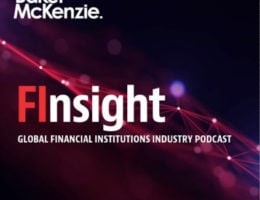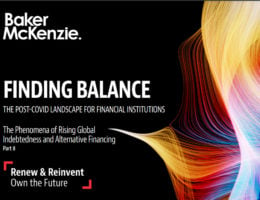The recent increase in value of cryptoassets as an investment class along with media coverage associated with high profile large investors has resulted in regulators warning investors to be cautious of the associated volatility risk. Against the background of these recent developments, we’re seeing increasing demand for legal advice in this area.
Episode 21: COP26 Key Takeaways for Sovereign Wealth Funds
In this episode of FInsight, Andrew Hedges and Kay She from Baker McKenzie’s EMI group in London discuss their experience and observations while on the ground in Glasgow. They cover business imperatives and challenges affecting the global economy and how sovereign wealth funds are well-positioned to influence and make an impact on broader sustainability goals and action plans. As discussions on climate-related issues evolve from commitments to execution in the recent COP26 UN Climate Change Conference, we unpack some of the key takeaways relevant for sovereign wealth funds.
The risks arising from unsustainable indebtedness to which both traditional and alternative financing sectors have exposure are higher in emerging economies, where the debt burden is much more elevated generally and whose borrowers are more susceptible to default if (as is expected), US dollar interest rates rise. Emerging economies with less policy intervention, monitoring and regulation are more vulnerable than advanced economies. This eighth installment focuses on the phenomena of rising global indebtedness and alternative financing.
Taking off from the guide Crypto around the World, the second of two episodes takes a closer look at market abuse, sustainability, decentralized finance and future developments. Sue McLean, a partner in our London office, talks to the team that started this project: Iris Barsan, counsel from our Paris office; Julian Hui, associate from our London office; and Chris Murrer, a US attorney in our Zurich office. They also cover specific regulatory and policy considerations, as well as the future impact of central bank digital currencies.
Episode 19: Crypto around the World (Part 2) Taking off from the guide Crypto around the World, the second of two episodes takes a closer look at market abuse, sustainability, decentralized finance and future developments. Sue McLean, a partner in our London office, talks to the team that started this project: Iris Barsan, counsel from our Paris office; Julian Hui, associate from our London office; and Chris Murrer, a US attorney in our Zurich office. They also cover specific regulatory and policy considerations, as well as the future impact of central bank digital currencies.
In this episode of FInsight, Baker McKenzie partners Daniela Fonseca Puggina from our Miami office and Jennifer Semko from our Washington D.C. office discuss litigation readiness for FIs. The episode also covers potential vulnerabilities and disputes that they need to prepare for, current and emerging trends in litigation (from our Litigation Intelligence Tool and Report), and how they can benefit from litigation preparedness.
In the latest episode of the Global Financial Industry Podcast, Baker McKenzie associates discuss: Sovereigns series – key principles of investment treaty protection. The episode covers recent examples of sovereign wealth fundsSWFs bringing investment treaty claims and how others can obtain access to these protections. The episode also analyzes why investors should consider investment treaties as part of their decision-making process.
COVID-19 represents one of the greatest ever shocks to our economies and, in consequence, to the business models of financial institutions and the way they do business. While many changes to business processes and operations were already taking place prior to the pandemic, COVID-19 has given many added impetus and urgency. Decision-makers must choose between adapting a wait-and-see approach or implementing more proactive strategies to safeguard and, if possible, grow their businesses.
In this special edition, Eva-Maria Segur Cabanac, a partner in our Vienna office and global sustainability lead for financial institutions, and Jennifer Klass, a partner in our New York office and co-chair of the financial regulation and enforcement practice in North America, talk with Ying Yi Liew on how the COVID-19 pandemic led to the prioritization of Environmental, Social, and Governance (ESG) considerations among financial institutions (FIs).
COVID-19 represents one of the greatest ever shocks to our economies and, in consequence, to the business models of financial institutions and the way they do business. While many changes to business processes and operations were already taking place prior to the pandemic, COVID-19 has given many added impetus and urgency. Decision-makers must choose between adapting a wait-and-see approach or implementing more proactive strategies to safeguard and, if possible, grow their businesses.








